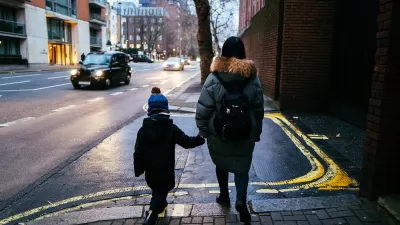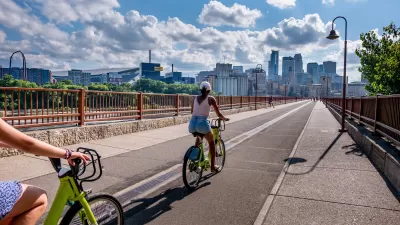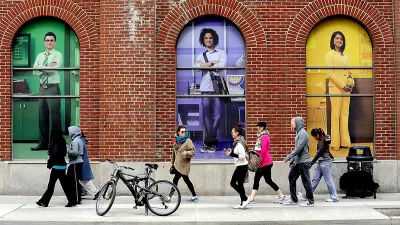Gas tax increases can mean more road funding, period, particularly where constitutional restrictions prohibit spending gas tax revenues on other modes, as exists in Pa.; yet all modes will benefit from the 28-cent gas tax increase legislation.
Angie Schmitt writes that transit will definitely benefit from the bill that Gov. Tom Corbett signed on Monday that is estimated to increase wholesale gas taxes by 28-cents over three years. This increase includes the elimination of the 12-cent state excise tax on gasoline.
Philadelphia transit agency SEPTA gets a big funding boost, enough to spare disastrous service cuts. Pittsburgh transit will also get some much welcome financial stability after years of uncertainty, fare hikes, and threats to service.
According to The Daily Pennsylvanian, the bill "will provide about $350 million in funding to SEPTA, which would have closed nine of its 13 regional rail lines by 2023 if it did not receive the extra funds." Read more about the "Doomsday Plan" the agency had prepared.
The below email from the Pittsburgh Post-Gazette explains how public transit received funding from the bill. Pennsylvania is one of 30 states that restricts gas tax revenues to road-only applications according to Brookings "Fueling Transportation Finance: A Primer on the Gas Tax" (PDF).
Transit will get funding from a variety of sources, but nothing from the Oil Company Franchise Tax. The Pa Turnpike currently pays PennDOT $450 million a year, $200 million of which goes to roads-bridges and $250 million to transit. The $200 million will be redirected to transit. Some "nonrestricted" vehicle fees that aren't constitutionally reserved for roads-bridges will go to transit, as will a share of the increases in traffic fines.
Walking and biking are also big winners, writes Sarah Stuart, whose group, PA Walks and Bikes, had been lobbying the legislature all year to ensure that active transportation funding would be in the bill.
As (PennDOT Secretary Barry) Schoch told advocates Monday night, “This is the biggest step forward for the bicycle and pedestrian modes of transportation in the history of Pennsylvania.”
Stuart lists four ways in which active transportation benefits, including:
- Sets an annual minimum of $2 million of that fund to be spent on bicycle and pedestrian facilities;
- Explicitly states that Pennsylvania’s comprehensive transportation system includes Pennsylvania’s “numerous bicycle and pedestrian facilities,” which will make it easier for bicycle/pedestrian projects to compete for highway funds.
Stuart credits all the groups working "with the Keystone Transportation Funding Coalition and the health groups that collaborated on Walk Ride PA" for the funding for active transportation.
According to the Pittsburgh Post-Gazette, the legislation "will result in a net increase in the state gasoline tax of 9.5 cents per gallon starting Jan. 1; another 9.7 cents for 2015; and at least 8 cents for 2017." It is anticipated that gas retailers will pass "all or most" of the tax to motorists, writes Dustin Hockensmith of The Patriot-News.
Ryan Holeywell of Governing writes that the new law "will eventually mean more than $2.3 billion annually in additional funds for transportation infrastructure."
FULL STORY: Pennsylvania Transportation Bill a “Dramatic Win” for Biking and Walking

Alabama: Trump Terminates Settlements for Black Communities Harmed By Raw Sewage
Trump deemed the landmark civil rights agreement “illegal DEI and environmental justice policy.”

Study: Maui’s Plan to Convert Vacation Rentals to Long-Term Housing Could Cause Nearly $1 Billion Economic Loss
The plan would reduce visitor accommodation by 25% resulting in 1,900 jobs lost.

Planetizen Federal Action Tracker
A weekly monitor of how Trump’s orders and actions are impacting planners and planning in America.

Wind Energy on the Rise Despite Federal Policy Reversal
The Trump administration is revoking federal support for renewable energy, but demand for new projects continues unabated.

Passengers Flock to Caltrain After Electrification
The new electric trains are running faster and more reliably, leading to strong ridership growth on the Bay Area rail system.

Texas Churches Rally Behind ‘Yes in God’s Back Yard’ Legislation
Religious leaders want the state to reduce zoning regulations to streamline leasing church-owned land to housing developers.
Urban Design for Planners 1: Software Tools
This six-course series explores essential urban design concepts using open source software and equips planners with the tools they need to participate fully in the urban design process.
Planning for Universal Design
Learn the tools for implementing Universal Design in planning regulations.
Caltrans
Smith Gee Studio
Institute for Housing and Urban Development Studies (IHS)
City of Grandview
Harvard GSD Executive Education
Toledo-Lucas County Plan Commissions
Salt Lake City
NYU Wagner Graduate School of Public Service





























